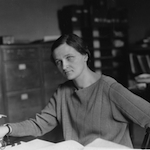
Cecilia Payne-Gaposhkin
Cecilia Payne-Gaposhkin found scientific success about as early in her career as possible. In 1925, she published findings that all stars have a significant amount of hydrogen in them and that star spectra differed only as a result of their different temperatures. This was for her PhD dissertation—something Yerkes Observatory Otto Struve found remarkable when he described Payne’s paper as “the most brilliant PhD thesis ever written in astronomy.”
Payne-Gaposhkin didn’t visit the Observatory, at least not officially, until 1942, long after her influential thesis. By that point, she had begun work at the Harvard College Observatory, studying variable stars to determine the structure of the galaxy.
The Facts
OccupationAstronomer
Date & Place of BirthMay 10, 1900 in Wendover, Buckinhamshire, England
Date & Place of DeathDecember 7, 1979 in Cambridge, Massachusetts
Alma Mater1923 Newham College at Cambridge University
1925 Radcliffe College (PhD)